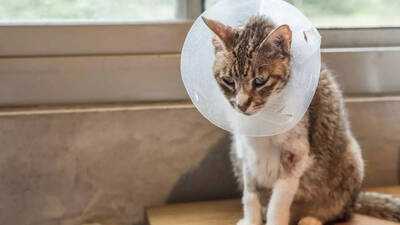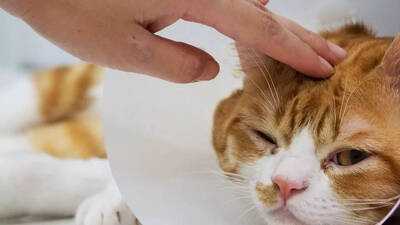Like humans, cats, too, can struggle with lingering immune system issues after certain viral infections. One of the most serious examples is feline infectious peritonitis , or FIP. According to recent studies, this disease may mirror what some researchers have described as a “Long COVID” in cats.
Scientists studying FIP are hoping it can help shed light on how immune responses in humans go awry after viral infections like COVID-19. In fact, one small study has already pointed to a potential cell-based therapy for cats recovering from FIP, a treatment that’s now also being looked at for human patients dealing with post-viral complications.
What is FIP?

FIP stands for feline infectious peritonitis, a disease triggered by a coronavirus that normally lives quietly in a cat’s gut. In most cats, this virus, also called feline coronavirus , stays in the intestines and might cause mild stomach upset, nothing more.
But sometimes, that virus mutates. And when it does, it can break through the gut wall and begin infecting immune cells. Once that happens, it can spread throughout the cat’s body and trigger an aggressive immune response: high fevers, systemic inflammation, and even damage to major organs. Blood tests often show a marked drop in white blood cells, which are essential to fighting off disease.
What causes this mutation? It's not entirely clear, but researchers believe a mix of genetics and environment plays a role.
How do cats catch it?

FIP itself isn't directly contagious; it's the unmutated feline enteric coronavirus (FECV) that spreads between cats. The problem begins when a cat picks up this common virus, which may later mutate into the FIP form.
Here's how cats typically become infected:
Kittens, often, catch it from their mother during grooming or nursing.
The virus is mostly shed through poop. Litter boxes shared among multiple cats are a major source of transmission.
Bowls, grooming habits, and even saliva can spread it from cat to cat.
While not a primary route, respiratory droplets may play a small role
As per WebMD, once a cat is infected with the enteric virus, they may shed it for weeks, or even for life. And while most infected cats stay healthy, a few will develop the deadly mutated version that causes FIP.

How to protect your cat?
Until recently, the infection was deadly, but an antiviral agent called GS-441524 is now available that can provide a cure. However, even after cats recover, their immune systems often remain activated like Long COVID in humans, thus our best bet is to prevent it from happening altogether.
You can do so by avoiding cramming a lot of cats in one place, if you have many cats. Further, make sure to keep their litter boxes and food bowls separately. And last but not least, proper vet visits, nutrition and stress free environment will always make a difference.
Disclaimer: This article is for informational purposes only and is not intended to replace professional veterinary or medical advice. While emerging research draws parallels between feline infectious peritonitis (FIP) and post-viral conditions like Long COVID in humans, such comparisons are still under investigation and should be interpreted cautiously. Always consult a licensed veterinarian regarding your pet’s health or a qualified healthcare provider for any concerns about post-viral symptoms in humans.
Scientists studying FIP are hoping it can help shed light on how immune responses in humans go awry after viral infections like COVID-19. In fact, one small study has already pointed to a potential cell-based therapy for cats recovering from FIP, a treatment that’s now also being looked at for human patients dealing with post-viral complications.
What is FIP?

FIP stands for feline infectious peritonitis, a disease triggered by a coronavirus that normally lives quietly in a cat’s gut. In most cats, this virus, also called feline coronavirus , stays in the intestines and might cause mild stomach upset, nothing more.
But sometimes, that virus mutates. And when it does, it can break through the gut wall and begin infecting immune cells. Once that happens, it can spread throughout the cat’s body and trigger an aggressive immune response: high fevers, systemic inflammation, and even damage to major organs. Blood tests often show a marked drop in white blood cells, which are essential to fighting off disease.
What causes this mutation? It's not entirely clear, but researchers believe a mix of genetics and environment plays a role.
How do cats catch it?
FIP itself isn't directly contagious; it's the unmutated feline enteric coronavirus (FECV) that spreads between cats. The problem begins when a cat picks up this common virus, which may later mutate into the FIP form.
Here's how cats typically become infected:
Kittens, often, catch it from their mother during grooming or nursing.
The virus is mostly shed through poop. Litter boxes shared among multiple cats are a major source of transmission.
Bowls, grooming habits, and even saliva can spread it from cat to cat.
While not a primary route, respiratory droplets may play a small role
As per WebMD, once a cat is infected with the enteric virus, they may shed it for weeks, or even for life. And while most infected cats stay healthy, a few will develop the deadly mutated version that causes FIP.
How to protect your cat?
Until recently, the infection was deadly, but an antiviral agent called GS-441524 is now available that can provide a cure. However, even after cats recover, their immune systems often remain activated like Long COVID in humans, thus our best bet is to prevent it from happening altogether.
You can do so by avoiding cramming a lot of cats in one place, if you have many cats. Further, make sure to keep their litter boxes and food bowls separately. And last but not least, proper vet visits, nutrition and stress free environment will always make a difference.
Disclaimer: This article is for informational purposes only and is not intended to replace professional veterinary or medical advice. While emerging research draws parallels between feline infectious peritonitis (FIP) and post-viral conditions like Long COVID in humans, such comparisons are still under investigation and should be interpreted cautiously. Always consult a licensed veterinarian regarding your pet’s health or a qualified healthcare provider for any concerns about post-viral symptoms in humans.
You may also like

Democrat congressman Greg Casar introduces bill to ban AI-driven price; slams 'surveillance pricing'; seeks Republican support

Ozzy Osbourne's story of success with Black Sabbath before axe and solo stardom

Pub landlord will spend rest of life in care home after punter's 'catastrophic' punch

Emmerdale fans 'solve' jaw-dropping John twist - but another victim 'sealed'

Madhya Pradesh: Tiger Skin Found At Deputy Commissioner's House In Jabalpur





